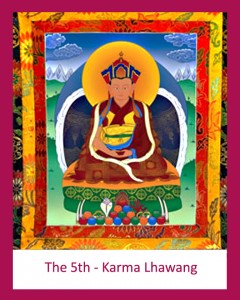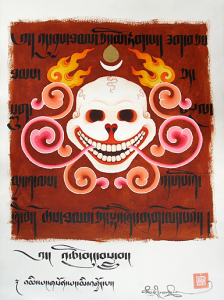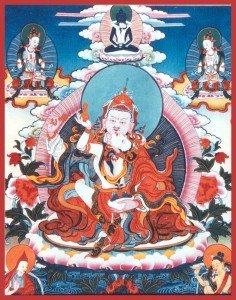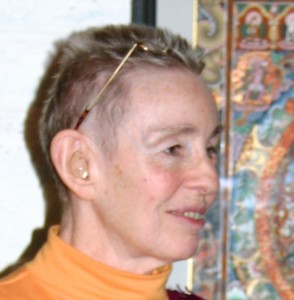
An excerpt from a teaching called Perception and Karma by Jetsunma Ahkon Lhamo
In order to pacify the karma of our mind, we need to employ the methods of Dharma. These methods consist of generating oneself in a pure form, free of attachment and desire, meditating on the nature of emptiness, contemplating the nature of emptiness, engaging in compassionate and pure activity in order to pacify the karma of our minds. We engage in all of these things. These are the means by which eventually, over a period of time, the karma of our mind will change. It will change. How quickly it changes is up to you. No one can predict that. It really depends on you. It depends on how diligently and deeply you practice, how clear you are about what you want, how deep you can allow your understanding to go, and how much you put into it. There is no law or force outside of you that pushes you to have progress at a certain level or in a certain way. It is purely up to you.
The experience that we have, however, and the habitual tendencies we have are so strong, that even hearing this is a little bit like riding a Ferris wheel. When you ride to the top of a Ferris wheel you can look down at the whole world. You can see the horizon, you can see the lights, you can see the buildings and you can see people, and you go, “Oh, it looks like that, does it?” Then the Ferris wheel comes down and you get off and you’re on that ground level. You are in it, walking the streets. You forget that there is a horizon. You forget that there are millions and millions of sentient beings per square block. You don’t have any view so we continue with that habitual compulsive tendency to act and react in the ways that we do.
These teachings sound disturbing and they should be disturbing for people that have no access to dharma. Within that circular, compulsive, experiential procedure there is no end to it. One cannot do something that will end the phenomena because the more you do the more you interact between self and other. The more you interact between self and other, the more that you try to accomplish, the more effortful your efforts are, the more engaged you are in cause and effect relationship. The more cause and effect relationships you engage in, the more karma continues, the more exaggeration continues. The process does nothing but give birth to itself. There’s no end to it.
For those who have the opportunity to practice the path that is brought about, not through ordinary means of cause and effect, not through using ordinary techniques of manipulating phenomena and increasing exaggeration, but rather by using techniques that are birthed from primordial wisdom and that bring about the pacification and the end of cause and effect relationships, you should thank Buddha because there is an end to suffering. Having seen the impenetrability of this tight constant delusion, having seen how it simply gives birth to itself and does more and more and more, having understood this, you should look at the path that comes from the primordial wisdom state and that offers the necessary technology to bring about the end of cause and effect relationships, and feel tremendously relieved. It is like you have been sifting through garbage for many lifetimes, and suddenly you have come upon a precious jewel. Suddenly you have found the wish-fulfilling jewel. With that you should develop some sense of determination.
That determination can be a very illusory thing. I’m talking about really understanding for yourself, not just hearing my words, but taking the time to contemplate and understand how useless it is to combat this thing you’re in with the ways that you do. To really contemplate on how useless your actions are to end something that can’t be ended. To really contemplate in such a way that you look at the way you’re manipulating phenomena and see that it’s nothing. You might as well do nothing. In fact, you’re getting yourself in deeper and deeper.
Contemplate that in such a way that you become armed with a foundational view or foundational understanding that says to you that this stuff is stupid. It’s not only stupid, it’s deadly, it’s horrible and there’s no way out of it. To be involved in cyclic existence is horrible beyond belief. Be determined to examine the nature of your mind. Watch yourself as you engage in it, and from that point, use these techniques to begin to pacify the causes of the experience that you’re having, which is karma.
That determination is the kind of determination that doesn’t make you practice a little bit more for a few days and then waste away again. It’s the kind of determination, for instance, as a monk or a nun that would make you say, “Look at these robes, I will never abandon them. How precious that I have found the supreme vehicle.” Even if men or women came dancing naked through the room and they were all gorgeous, it wouldn’t affect you at all. You wouldn’t need the world to hide itself so that you could maintain your vows. You would have that kind of renunciation. You would understand and even if the most delightful sensual experiences were to present themselves to you, they would be nothing to you. What is it? It’s nothing. It’s garbage. It begets more of the same. You can’t have anything without losing it.
For those of us who are renunciates in different ways, you should have the same experience. You should look at whatever experience you have in your life and know that it can’t dupe you anymore. It’s not that you won’t achieve, it’s not that you won’t have money; it’s not that you won’t have the experiences that people have but it just won’t dupe you anymore. You can get married, you can have money, it doesn’t matter what you do, but it won’t dupe you anymore because you know what it’s about.
Having this sense of renunciation, you develop a kind of unshakeable discipline. It’s not the discipline that means I should do so many mantras per day. This discipline should go even deeper than that. You should be practicing constantly. You should be constantly developing some space in the middle of that hard core perception of self and other. You should be developing some space in the middle of all your reactions. Develop the spaciousness and the relaxation that is based on understanding what’s what, and then develop it through your practice. Please refer back to the teaching on Monday night. I hope that all of you will try to hear that teaching again. The constant revelation in every piece of phenomena is the heart of emptiness. That is its taste.
Copyright © Jetsunma Ahkon Lhamo. All rights reserved








